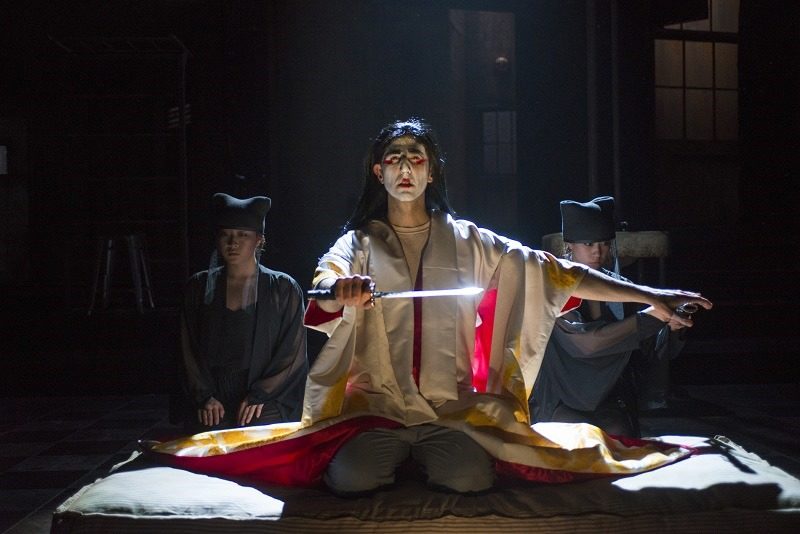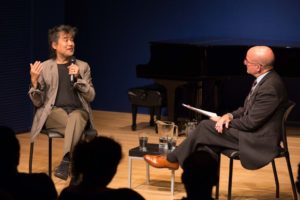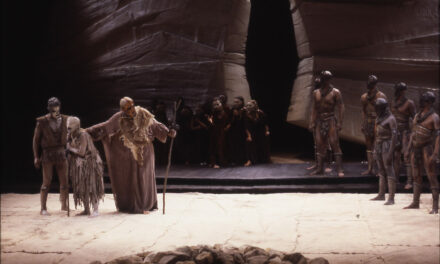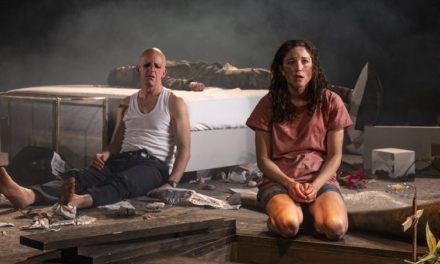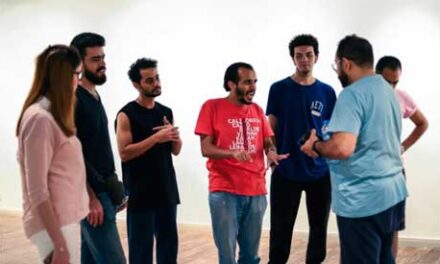A world class librettist, David Henry Hwang’s career has been noted for success in Opera, Musical Theatre, and plays for the stage. With M. Butterfly, Aida, and most recently, Dream of the Red Chamber, Hwang is an artist who interrogates East-West relations.
With OPERA America President/ CEO, Marc A. Scorca, Hwang shared his beginnings as a playwright in Los Angeles, including at Stanford, pulling friends out of dorm rooms to perform in his plays. Some of what Hwang worked on was a protest theater. He told an audience of students and arts professionals at The National Opera Center that was interested in “clash of cultures, immigration, and of course, assimilation.”
After taking workshops with Maria Irene Fornes and Sam Shepherd, Hwang worked on plays. While he couldn’t “publish the phone book,” he could give rhyme and meter to the complex world that surrounded him. His first success FOB (short for Fresh Off the Boat) led to increased recognition in the theater community. A playwright and a librettist, Hwang attended Yale University and continued. With support from The Public Theater, TCG (Theatre Communications Group), and other organizations, his work became increasingly recognized.
Speaking to the group of journalists, arts professionals, and students, Hwang addressed “theatricalism.” He explained, “Theatricalism- that is trying to utilize all of the different things that theater, I think, does better than other mediums. So, not only the drama and dialogue and all that, but also explicitly theatrical representations like dance, and music – and in my case – Chinese opera. So I am, sort of, interested in a more theatricalized form of presentation in general.”
M. Butterfly, which became a Broadway play, traces an opera performer through the Chinese revolution. It is based on the opera, Madama Butterfly by Giacomo Puccini. In M. Butterfly, an artist falls in love with a French businessman – the butterfly lives for the possibility of breaking free. The play deals with the politicization of the body and the idealization of the exotic. A chilling drama that later became a film, it ends with a plummeting descent into a jail cell.
Since M. Butterfly, Hwang’s artistry has been recognized by scholars, intellectuals, and a broader viewing audience. When speaking of opera, Hwang explained that opera is not like any other musical form of theater. He said, “I think that opera is the most theatrical form. You are dealing with a form that inherently announces that it is elevated from what we normally think of as reality. Simply by virtue of the fact that everybody is singing all the time, and in real life, you don’t do that. Musicals, of course, are sort of in the middle there, because musicals usually have a book. They have people talking, and then, all of a sudden, they burst into song.”
He continued, “In a musical, you are, kind of, using music to express the most emotional moments. But, in opera, everybody sings all the time, and that automatically, kind of, notches up the degree to which you are already living an elevated story world.” About libretti, he continued, “One of the fun things is that the audience is very accepting of story points that are fantastic, and things that might be melodramatic if put into simply spoken prose. All of a sudden, are so emotionally rich, so we buy them, and we feel these things.”
When writing for opera, the dance between composer and librettist is delicate. Hwang explained that the new idea often begins with the composer. Words come second. When music and story intertwine, having the vision and finding the words bring value and expression to the work.
An enigmatic figure, it’s clear that Hwang has navigated the years with precision and dedication for making theater. Works like Chinglish and Yellow Face have tested our cultural perceptions. Hwang’s success in the commercial arena with Aida and Tarzan is mixed with his ability to take a very good idea, and move it from the not-for-profit sector to the commercial sector. Hwang stands the test of time. It’s likely that diversity and inclusion, in the larger world of theatre and opera, will play a greater role in the 21st century.
The National Opera Center is a hub for performers, students, and arts leaders. Later in the season, Opera America’s Conversations series includes discussions of opera creation “from production to performance.” Speaking later in the Season is Mezzo-Soprano Jamie Barton and Soprano Renée Flemming. As Hwang speaks, he reiterates that affirmative action was extraordinarily relevant in his career.
Now a professor at Columbia University, Hwang offers ideas to students, after an award-winning career in the industry. Appearing as comfortable with New York Theater as he is with the film-centric world of California, Hwang remains a central figure in Asian American writing.
His latest work, Dream of the Red Chamber, premiered at San Francisco Opera. Like so many operas, Dream of the Red Chamber deals with elevated stories and complex notions, including “red-ology.” The opera, with structure and words, was written in collaboration with Bright Sheng. Hwang explained that Sheng, “had a vision to tell the story.”
This post was written by the author in their personal capacity.The opinions expressed in this article are the author’s own and do not reflect the view of The Theatre Times, their staff or collaborators.
This post was written by Marcina Zaccaria.
The views expressed here belong to the author and do not necessarily reflect our views and opinions.

